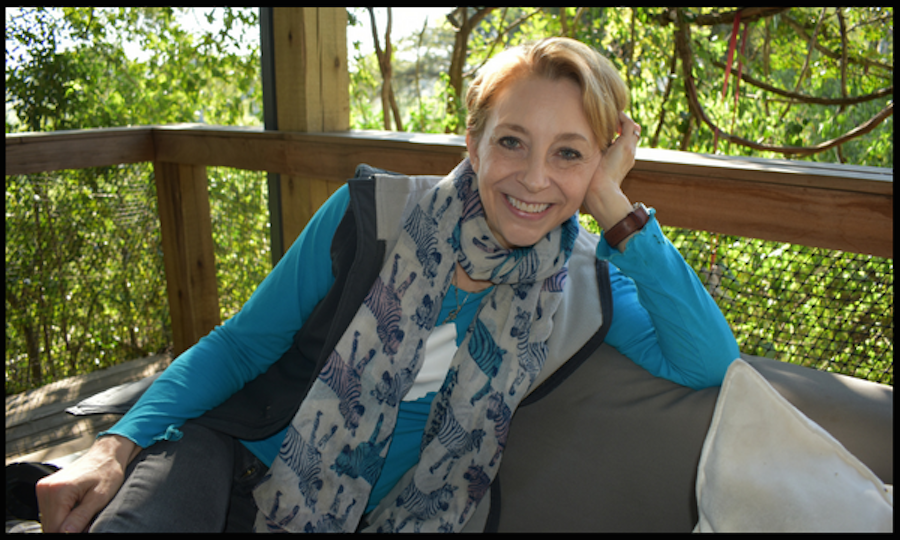To Stay Present, We Must Accept Change

A couple of weeks ago I boarded a plane from London to Philadelphia and immediately sensed something weird was going on. Our flight had been delayed for hours by mechanical problems, and I expected everyone, including the crew, to be tired and grumpy. Instead, the flight attendants appeared to have been drinking some sort of love potion. They practically leaped to assist us passengers as we arrived. They smiled into our eyes, joked with us, said things like, “Honestly, if there is anything I can do to make this flight more comfortable, please please let me know!” I’ve always experienced flight attendants as polite, but this was a whole new level.
Deciding that this particular cabin crew must be competing for some kind of award, I thanked my stars that I’d ended up on their plane and settled back to read the book I’d just bought: In Love With the World, by Yongey Mingyur Rinpoche. It’s the true account of a Tibetan Buddhist monk who sneaked away from his monastery to seek adventures as a wandering yogi and ended up nearly dying.
Dying, I soon learned, is a very hot topic in Tibetan Buddhism. Mingyur Rinpoche reported that Tibetan children get lectured about “death and impermanence” from the cradle. When he was little and wanted a toy, his father told him, “That toy will fall apart; it will die. To fasten so tightly to an object that has no lasting quality is like trying to hold air in your hands. This cannot bring you real happiness.”
Well, okay then.
This is excellent advice, I thought. But to lay it on a toddler? Yikes.
I put the book down and looked across the aisle, where a vibrant young couple was playing with their two small daughters. Now, like many frequent travelers, I generally find babies on a plane about half a click less alarming than snakes on a plane (this was especially true when the babies were mine). But watching this young couple and their little ones gave me a bit of relief after reading so much about death. They seemed delighted to be entertaining a six-month-old and a preschooler in an enclosed space for hours on end.
Another of my frequent-traveler habits is avoiding conversations with strangers, but I soon found myself waving at the children and then exchanging a few words with their mother, Sarah. She introduced me to her husband Jeff and their children: Beatrice, an unusually jolly baby, and four-year-old Edith, whose blond hair and sky-blue eyes made her look like Alice in Wonderland. This was their first trip from their home in England to Philadelphia. I asked if they had family in the States.
“No,” said Sarah. “We’re going to see some special doctors because Edith has a terminal brain disease.”
It was like running into a door. I just sat there gaping.
“Oh, please don’t feel awkward,” said Sarah. “It was terrible when we heard the diagnosis, but once you get past the shock it’s really about life, not death, isn’t it? I mean, we’re all terminal when you think about it. And this, right now, is so lovely.” She gestured around the cabin. “The whole crew knows, and they’ve all been helping Edith have a really special experience.”
I felt as if I were in a snow globe that had just been shaken hard, setting all my preconceptions adrift. The sweet mood on that plane wasn’t a product of youth and health. It came from the fact that this beautiful little girl was dying. As Sarah and I continued to talk and I watched her more closely, I thought I could see the immense burden of grief and loss she carried. But mingled with that was an equally enormous level of joy. It didn’t feel like denial. It was deep, solid, genuine. These people shone.
Glancing around the cabin, I saw that the flight attendants were still being unusually kind—make that downright loving—not only to Edith and her family but to every passenger on board. I thought of the Tibetan saying, “Since death is certain and the hour of death is uncertain, what is most important?” The people on this plane had clearly decided that the most important thing was full, compassionate presence.
Little Beatrice began to squall, and Sarah took her on a walkabout around the cabin. I dived back into my book, suddenly eager to learn whatever Mingyur Rinpoche had to teach. His central message was that the only permanent thing is impermanence, and accepting this allows us to transcend our fear of death, setting us free to live truly calm and joyful lives.
I flashed back to a confusing argument I’d had with a friend in college. He asked me what I feared most about life. I said “Transience,” meaning that nothing lasts. He thought I said “transients,” meaning homeless people, and was shocked by my prejudice. We didn’t figure out what had gone wrong until days later. Anyway, by the end of the discussion, I still remained convinced that the inexorable flow of time and change is the most awful thing about the universe. I still haven’t really changed my mind, but shockingly, I’ve never gotten the universe to agree with me. Not for one single second.
I watched Edith’s father kneeling in front of her, helping her eat a snack, making goofy faces to entertain her. To be so convincingly joyful, Jeff must have come to an acceptance of his daughter’s prognosis. According to Mingyur Rinpoche, that acceptance is not only our only haven in a world that never stops changing but also the source of our deepest wisdom.
I began to wonder how I could begin living more wisely myself. A few things occurred to me right off the bat. For instance, whenever I set out to create something—a project, a relationship, an idea—I can remind myself to expect it to change, rather than demanding it remain static. I can stop struggling against the fact that my body is aging. I can notice every day that continuous, fluid transformation is a fundamental aspect of our experience, and try to relax into it.
The paradox of accepting continuous change is that as we stay present with transience, we begin to identify less with what changes, and more with presence itself. We notice that part of us—the most essential part—is pure observing consciousness, immovable and indestructible as space. And we discover that this changeless no-thing-ness at our core is made entirely of love.
As we began our descent, the entire flight crew gathered around Edith and her family like a football huddle. I could only see their uniformed backs. I think they were saying goodbye. This enchanted trip was over. There was sorrow in that. But the thing that brought tears to my eyes was the sweetness of this perfect, eternal, fleeting moment.
“Paying no attention to the mini-deaths of daily life,” writes Mingyur Rinpoche, “is like confusing diamonds with pebbles and throwing them away.” Instead, we can continuously let go of what is passing, and open ourselves to what is being born. To remind themselves of this, Tibetans have a custom of turning over a cup each night, “signifying not just the end of the day, but the end of one’s life.” In the morning, they turn the cup upright, celebrating their awakening to a new day, a new life, filled with unforeseen possibilities.
By the time I arrived home I had a slip of paper with Sarah’s email address written on it, and a commitment to helping Edith and her family in any way I could. More importantly, I had a sense of the wisdom that can arise from the very center of what we fear most.
It was very late when I finally got to bed. My back ached. My eyes burned. My heart felt tender, as if its armor had been stripped away. But that wasn’t a bad feeling. In fact, I found I could rest in the sensation, in that vulnerable openness. It felt like home. I sat in bed, sipped a cup of herbal tea, and practiced relaxing my resistance into the flow of change. Just before switching off the light, I turned my empty cup upside down.

The photo above shows Edith, her family and me at Philadelphia Airport after our long flight. If you feel moved to contribute any amount of money to give Edith some beautiful memories and the best possible healthcare, please consider donating to the fundraising campaign that I asked Sarah to create:https://www.gofundme.com/f/wc8nam-for-edith
For more information about Martha Beck, go to marthabeck.com/
This essay was featured in the July 7th edition of The Sunday Paper. The Sunday Paper inspires hearts and minds to rise above the noise. To get The Sunday Paper delivered to your inbox each Sunday morning for free, click here to subscribe.


